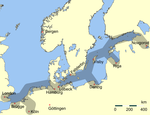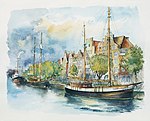Polotsk
Polotsk
Polatsk | |
|---|---|
 | |
|
UTC+3 (MSK) | |
| Postal code | 211291, 211400—211402, 211404—211415, 211422 |
| Area code | +375 214 |
| License plate | 2 |
| Website | polotsk |
Polotsk (
Nomenclature
The
Geography
This section needs expansion. You can help by adding to it. (January 2023) |
Lakes
Climate
| Climate data for Polotsk (1991–2020) | |||||||||||||
|---|---|---|---|---|---|---|---|---|---|---|---|---|---|
| Month | Jan | Feb | Mar | Apr | May | Jun | Jul | Aug | Sep | Oct | Nov | Dec | Year |
| Record high °C (°F) | 4.4 (39.9) |
5.2 (41.4) |
11.8 (53.2) |
22.2 (72.0) |
26.8 (80.2) |
28.7 (83.7) |
30.3 (86.5) |
29.9 (85.8) |
24.9 (76.8) |
17.9 (64.2) |
10.4 (50.7) |
5.7 (42.3) |
30.3 (86.5) |
| Mean daily maximum °C (°F) | −2.0 (28.4) |
−1.1 (30.0) |
4.2 (39.6) |
12.4 (54.3) |
18.7 (65.7) |
22.1 (71.8) |
24.1 (75.4) |
23.0 (73.4) |
17.3 (63.1) |
10.0 (50.0) |
3.3 (37.9) |
−0.6 (30.9) |
11.0 (51.8) |
| Daily mean °C (°F) | −4.5 (23.9) |
−4.4 (24.1) |
0.1 (32.2) |
7.0 (44.6) |
12.8 (55.0) |
16.5 (61.7) |
18.5 (65.3) |
17.2 (63.0) |
12.0 (53.6) |
6.2 (43.2) |
1.0 (33.8) |
−2.7 (27.1) |
6.6 (43.9) |
| Mean daily minimum °C (°F) | −6.7 (19.9) |
−7.2 (19.0) |
−3.4 (25.9) |
2.1 (35.8) |
7.2 (45.0) |
11.1 (52.0) |
13.3 (55.9) |
12.2 (54.0) |
7.8 (46.0) |
3.3 (37.9) |
−0.8 (30.6) |
−4.6 (23.7) |
2.9 (37.2) |
| Record low °C (°F) | −21.3 (−6.3) |
−19.5 (−3.1) |
−12.9 (8.8) |
−4.9 (23.2) |
−0.1 (31.8) |
4.6 (40.3) |
8.2 (46.8) |
5.5 (41.9) |
0.8 (33.4) |
−4.8 (23.4) |
−9.9 (14.2) |
−14.4 (6.1) |
−21.3 (−6.3) |
| Average precipitation mm (inches) | 49.9 (1.96) |
46.6 (1.83) |
39.2 (1.54) |
41.0 (1.61) |
63.7 (2.51) |
84.3 (3.32) |
89.2 (3.51) |
69.9 (2.75) |
59.4 (2.34) |
64.9 (2.56) |
54.0 (2.13) |
49.9 (1.96) |
712.0 (28.03) |
| Average precipitation days (≥ 1.0 mm) | 12.2 | 10.5 | 9.6 | 7.6 | 9.5 | 11.1 | 10.9 | 9.6 | 8.8 | 11.1 | 10.5 | 11.7 | 123.1 |
| Source: NOAA[2] | |||||||||||||
History
Polotsk is one of the earliest mentioned cities of the Eastern Slavs. The Primary Chronicle mentioned Polotsk in the year 862 (as Полотескъ, /poloteskŭ/), together with Murom and Belozersk. However, an archaeological expedition from the Institute of History of the National Academy of Sciences of Belarus suggests that Polotsk existed in the first half of the 9th century.[3]
The first known prince of Polotsk was Rogvolod (ruled 945–978). He had two sons and a daughter named Rogneda. Rogvolod promised Rogneda to the prince of Kiev, Yaropolk, as a wife. But Yaropolk's brother, Vladimir, had attacked Polotsk before Yaropolk came. He killed Rogvolod, his wife and sons, and married Rogneda.[4][5]
Vladimir and Rogneda had five children and the eldest of them,
Between the 10th and 12th centuries, the
During the

In 1772, Russia seized Polotsk (then Połock) as part of the First Partition of the Polish–Lithuanian Commonwealth.
Since the Russian Empress
During the French invasion of Russia the district saw two battles, the First Battle of Polotsk (August 1812) and the Second Battle of Polotsk (October 1812).
In 1820, pressure from the Russian Orthodox Church influenced the Russian Emperor Alexander I to exile the Jesuits and to close the Polock Academy, there were 700 students studying there.[8][9] The Russian authorities also broke up the Academy's library of 40,000–60,000 volumes, the richest collection of 16th- to 18th-century books — the books went to St. Petersburg, Kiev and other cities, 4000 volumes (along with books from other closed Jesuit schools) going to the St. Petersburg State University Scientific Library.[10][11]
Polotsk came under occupation by the German Empire between 25 February 1918 and 21 November 1918 during World War I, by Poland between 22 September 1919 and 14 May 1920 in the Polish–Soviet War. and by Nazi Germany between 16 July 1941 and 4 July 1944 during World War II. In August 1944, there were serious considerations to transfer Polotsk and its surrounding areas (18,000 square kilometers) with ~400,000 people from the Byelorussian SSR to the Russian SFSR, however Joseph Stalin, persuaded by Panteleimon Ponomarenko, eventually rejected to approve the already prepared transferring documents and subsequently Polotsk functioned as the center of Polotsk Region between 20 September 1944 and 8 January 1954.[12] A reorganisation of the area between Vitebsk and Molodechno Regions left Polotsk part of the former.
Cultural heritage

The city's
Cultural achievements of the medieval period include the work of the nun
The first Belarusian printer,
In September 2003, as "
Sports
The city has produced players for the Belarus national bandy team.[14] In October 2011, the team planned to participate in the Russian Cup in rink bandy,[15] but did not after all.
Notable people
- Uładzimir Arłou (b. 1953), Belarusian historian and writer[16]
- Lyavon Barshchewski (b. 1958), Belarusian philologist and politician[17]
- Boris Galerkin
- Andrei of Polotsk
- Bryachislav of Polotsk
- Euphrosyne of Polotsk
- Francysk Skaryna
- Gabriel Lenkiewicz
- Izyaslav of Polotsk
- Roman Catholic Church
- Mary Antin
- Rogneda of Polotsk
- Rogvolod
- Rogvolod Vseslavich
- Sophia of Minsk, Queen of Denmark
- Symeon of Polotsk
- Vseslav of Polotsk
- Vyacheslav Gordanov
- Marina Osman
- Igor Shitov
- Council of the Republic of Belarus
Gallery
-
Saint Sophia Cathedral
-
Saint Sophia Cathedral
-
Bogoyavlensky Convent
-
Bogoyavlensky Cathedral
-
Convent of Saint Euphrosyne
-
Convent of Saint Euphrosyne
-
Polotsk main square with Hotel Dzvina
-
Railway station
-
Former Lutheran church
-
Church of Protection of Holy Virgin
-
Church of Andrew Babola
See also
- Krivichs
- Novopolotsk
- Plock
Notes
References
- ^ a b "Численность населения на 1 января 2024 г. и среднегодовая численность населения за 2023 год по Республике Беларусь в разрезе областей, районов, городов, поселков городского типа". belsat.gov.by. Archived from the original on 2 April 2024. Retrieved 12 April 2024.
- ^ "World Meteorological Organization Climate Normals for 1991-2020 — Polotsk". National Oceanic and Atmospheric Administration. Retrieved January 12, 2024.
- ^ Archaeologists have won the dispute in the ancient chronicles of the earlier date base of Polotsk
- ISBN 978-90-04-26022-1.
- ISBN 978-1-317-87224-5.
- ^ a b The New Cambridge Medieval History: c. 1300-c. 1415. p.706
- ^ a b The New Cambridge Medieval History: c. 1300-c. 1415. pp.769-770
- ^ Symposium 2014: Jesuit Survival and Restoration 1773 - 1814: 200th Anniversary Perspectives from Boston and Macau
- ISBN 9789004282384, pp. 83-98
- ^ "Polotsk history".
- ^ Stam, David H. International Dictionary of Library Histories. Chicago, Ill: Dearborn, 2001. vol 1, p. 686
- Радыё Свабода(in Belarusian).
- ISBN 5-87417-207-6, p.260
- ^ Bandy Archived 2011-09-04 at the Wayback Machine at Bandy2008
- ^ "Google Translate".
- ^ Uladzimir Arloǔ(Арлоў Уладзімір)
- ^ Lyavon Barshchewski: “I could become а prime minister. But not a president. And not a member of parliament. (Лявон Баршчэўскі: «Я прэм’ер-міністрам мог бы стаць. Але не прэзыдэнтам. І не дэпутатам»)

















